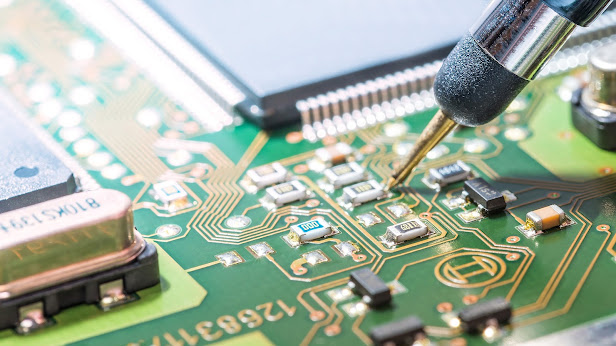3 Reasons Why ECM Repairs are Important
The Engine Control Module (ECM) is a crucial component in
modern vehicles, acting as the brain that manages various engine functions.
When the ECM malfunctions, it can lead to numerous problems, affecting
performance, efficiency, and safety. This article delves into three key reasons
why ECM repairs are essential, highlighting the benefits of maintaining this
critical piece of technology in optimal condition.
1. Enhancing Vehicle Performance
The primary function of the ECM is to control the engine’s
operations, including fuel injection, ignition timing, and emission control.
When the ECM is not functioning correctly, it can lead to suboptimal engine
performance.
Optimized Fuel Efficiency
A well-functioning ECM ensures that the engine receives the
correct amount of fuel at the right time. When the ECM is faulty, it might
cause the engine to run rich (too much fuel) or lean (too little fuel). Both
conditions can decrease fuel efficiency, leading to higher fuel costs.
Repairing the ECM can restore optimal fuel injection timing and mixture,
ensuring that the vehicle runs efficiently and economically.
Improved Power Output
The ECM also plays a crucial role in managing the engine’s
power output. It adjusts the air-fuel ratio and ignition timing to match
driving conditions and demands. A malfunctioning ECM might misinterpret these
conditions, resulting in reduced power and sluggish acceleration. By repairing
the ECM, you can ensure that the engine delivers its full power potential,
enhancing overall vehicle performance and driving experience.
Smoother Engine Operation
Issues with the ECM can cause the engine to run erratically,
leading to symptoms like rough idling, stalling, or hesitation during
acceleration. These problems not only degrade the driving experience but can
also cause additional wear and tear on engine components. Can address these
issues, leading to smoother and more reliable engine operation ecm repair from here.
2. Preventing Long-term Damage
Ignoring ECM issues can lead to more severe and costly
problems over time. The ECM monitors various engine sensors and makes
adjustments to ensure optimal performance and prevent damage. When the ECM
fails to perform these functions correctly, it can result in long-term damage
to the engine and other critical systems.
Protecting Engine Components
The ECM is responsible for controlling the ignition system,
including spark plug timing. If the ECM is faulty, it can lead to incorrect
ignition timing, causing pre-ignition or detonation. These conditions can
damage engine components such as pistons, valves, and the head gasket. Timely can
prevent these issues, protecting the engine from serious damage and prolonging
its lifespan ecm repairs click here.
Avoiding Catalytic Converter Damage
A malfunctioning ECM can cause improper fuel mixture,
leading to unburnt fuel entering the exhaust system. This can damage the
catalytic converter, a costly component that reduces harmful emissions.
Repairing the ECM ensures that the fuel mixture is correctly managed,
preventing damage to the catalytic converter and maintaining the vehicle’s
emission standards.
Minimizing Risk of Breakdowns
An unreliable ECM can cause unexpected engine shutdowns or
failures, leaving drivers stranded and necessitating costly emergency repairs.
Regular ECM maintenance and timely repairs can significantly reduce the risk of
sudden breakdowns, providing peace of mind and ensuring the vehicle’s
reliability.
3. Ensuring Safety and Compliance
The ECM not only enhances performance and prevents damage
but also plays a vital role in ensuring vehicle safety and compliance with
environmental regulations.
Maintaining Emission Standards
Modern vehicles are required to meet strict emission
standards to reduce environmental impact. The ECM controls the engine’s
emission systems, including the exhaust gas recirculation (EGR) valve and
oxygen sensors. A faulty ECM can result in increased emissions, failing to meet
regulatory standards. By repairing the ECM, you can ensure that your vehicle
remains compliant with emission regulations, avoiding potential fines and
contributing to environmental protection.
Enhancing Driver Safety
A malfunctioning ECM can compromise vehicle safety in
several ways. For instance, it might cause the engine to stall unexpectedly,
especially during critical driving situations like merging onto highways or
navigating intersections. Additionally, the ECM monitors and manages critical
systems such as the anti-lock braking system (ABS) and traction control.
Ensuring that the ECM is functioning correctly helps maintain these safety
systems, enhancing overall vehicle safety and protecting both the driver and
passengers.
Passing Vehicle Inspections
In many regions, vehicles are required to pass regular
inspections to ensure they are safe and environmentally compliant. A faulty ECM
can trigger the check engine light and lead to a failed inspection. Repairing
the ECM before an inspection can help ensure that your vehicle passes all
required tests, avoiding the hassle and expense of re-inspections.
In conclusion, ECM repairs are crucial for maintaining
vehicle performance, preventing long-term damage, and ensuring safety and
compliance. By addressing ECM issues promptly, you can enjoy a more efficient,
powerful, and reliable driving experience while also protecting your investment
and contributing to a safer, greener environment.




Comments
Post a Comment